Many people start taking fiber supplements like Metamucil, Citrucel, or psyllium husk to help with digestion, lower cholesterol, or manage blood sugar. But if you’re also on daily medication, you might be risking your treatment without even knowing it. Fiber doesn’t just pass through your gut-it can grab onto your pills and carry them out before they’re absorbed. This isn’t just a theory. It’s backed by real studies, doctors, and clinical guidelines. The good news? You don’t have to give up fiber. You just need to time it right.
How Fiber Interferes With Medications
Fiber supplements don’t digest. They swell up in your gut, pull water in, and move everything along faster. That’s great for constipation. But when a pill is sitting in the same space as a big ball of psyllium or oat bran, things get messy. Some medications stick to the fiber like glue. Others get swept out too quickly to be absorbed properly. Research shows this happens with several types of drugs. A 1993 study found that people taking levothyroxine (a thyroid hormone) had lower levels in their blood when they took it with fiber supplements. In some cases, their cholesterol went up because the thyroid meds weren’t working right. Another study showed that ispaghula husk (a type of psyllium) reduced levothyroxine absorption by just 9%-which sounds small, but for someone with hypothyroidism, even a small drop can mean fatigue, weight gain, or brain fog. Not every drug is affected the same way. For example, one study found no interaction between cellulose fiber and theophylline (a lung medication). Another found psyllium didn’t mess with calcium absorption in postmenopausal women. So it’s not fiber itself-it’s the combination of fiber and specific medications that matters.Medications That Definitely Need Space From Fiber
If you’re on any of these, you need to plan your fiber intake carefully:- Levothyroxine (Synthroid, Levoxyl): This is the most well-documented case. Even a small drop in absorption can throw off your entire hormone balance.
- Metformin: Used for type 2 diabetes. Fiber can slow its absorption, which might seem helpful-but it can also make blood sugar harder to predict.
- Lithium: A mood stabilizer. If your body absorbs less of it, your risk of relapse goes up. Too much? Risk of toxicity.
- Olanzapine (Zyprexa): An antipsychotic. Fiber can lower its levels, reducing its effect on symptoms.
- Carbamazepine (Tegretol): Used for seizures and nerve pain. Fiber can reduce how much gets into your bloodstream.
- Statins like lovastatin: One study showed pectin fiber caused LDL (bad cholesterol) to rise by up to 58% when taken together-because the statin wasn’t absorbed.
Some meds, like clopidogrel (Plavix) or rosuvastatin (Crestor), can be taken with regular meals-even high-fiber ones-because the fiber is spread out and not concentrated. But fiber supplements? Those are a different story. They’re like a fiber bomb in your gut. That’s why experts say to treat them like a drug interaction, not a harmless snack.
How Far Apart Should You Take Them?
The advice isn’t vague. Multiple trusted sources agree on clear timing:- Harvard Health says: Take your medication 2 to 3 hours before or after your fiber supplement.
- WebMD states: Take fiber supplements at least 2 hours away from other medications.
- FreeRX Blog recommends: For metformin, lithium, and olanzapine, wait 4 hours after taking the drug before taking fiber.
- Mayo Clinic confirms: Fiber supplements can reduce absorption of thyroid, diabetes, and depression meds-timing is key.
So what does this look like in real life?
If you take levothyroxine first thing in the morning on an empty stomach, don’t have your Metamucil until at least 3 hours later-say, after lunch. If you take your metformin with dinner, wait until the next morning to take your fiber supplement. If you’re on lithium and take it at night, don’t take fiber after dinner. Wait until breakfast.
It’s not about avoiding fiber. It’s about separating the two. Think of it like this: your medication needs a clear path to get absorbed. Fiber is like a crowd that blocks that path. Give it space, and both can do their jobs.

What About Fiber From Food?
Good question. Eating an apple, a bowl of oatmeal, or a salad with your pill? That’s usually fine. Why? Because the fiber is spread out, mixed with other nutrients, and not concentrated like in a supplement. A study showed that eating high-fiber meals didn’t significantly affect levothyroxine absorption the way a 3.4-gram psyllium capsule did.That’s why doctors don’t tell you to stop eating vegetables. They tell you to separate supplements from meds. Whole foods are part of a healthy diet. Supplements are tools-and like tools, they need to be used properly.
How to Make This Routine Stick
Trying to remember to wait 2 or 4 hours between meds and fiber sounds hard. But here’s how to make it easy:- Set phone alarms. One for your medication. One for your fiber. Label them clearly: "Levothyroxine - 7 AM" and "Metamucil - 10 AM".
- Use a pill organizer. Put your meds in one compartment, your fiber in another. Don’t mix them.
- Link it to habits. Take your fiber after your afternoon coffee. Take your thyroid med before breakfast. Make it part of your routine, not an extra chore.
- Keep a log. Write down what you took and when. If you feel off-tired, moody, dizzy-check your timing. It might be the cause.
Also, always drink a full glass of water with your fiber supplement. Without enough liquid, it can swell in your throat and cause choking. That’s not a myth-it’s a real safety risk.
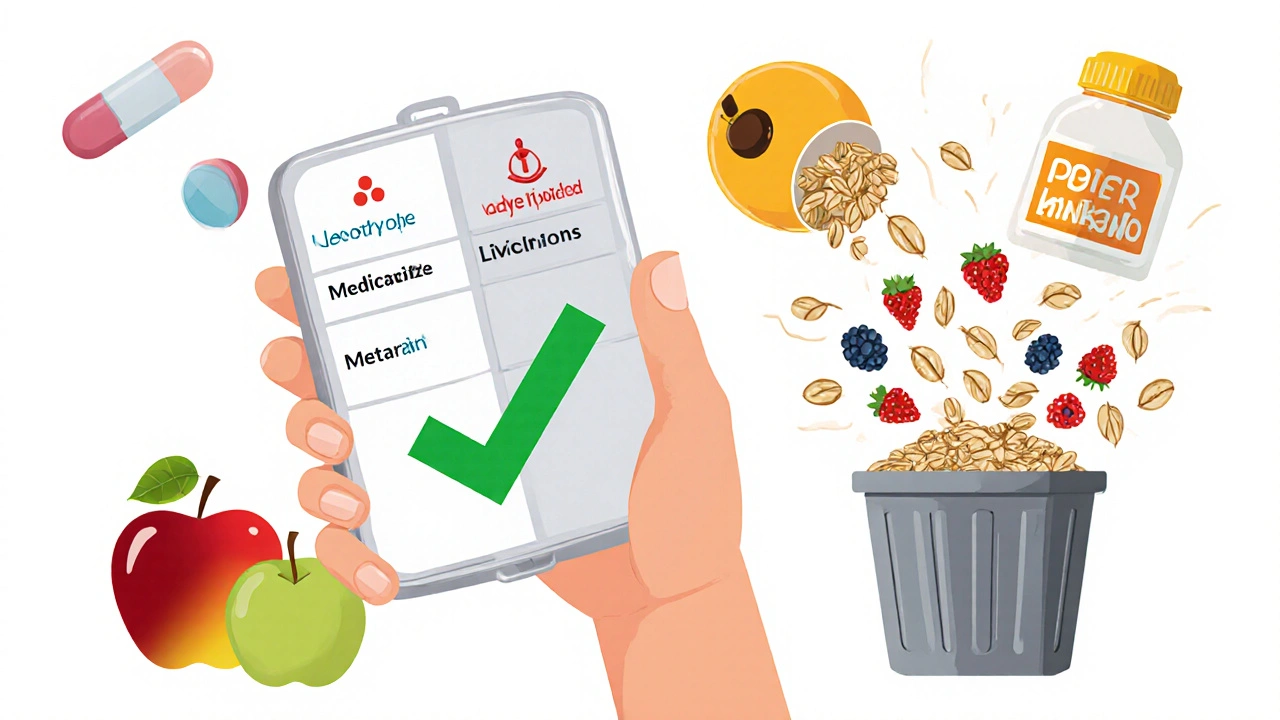
Why This Matters More Than You Think
You might think, "It’s just a little less absorption. How bad can it be?" But for some drugs, even a 10% drop changes everything.Take levothyroxine. The difference between 75 mcg and 67 mcg absorbed? That’s enough to make you feel sluggish, gain weight, or struggle to focus. For lithium, a small drop can trigger a manic episode. For metformin, it can mean higher blood sugar and more insulin resistance.
And here’s the kicker: most people don’t realize this is happening. They take their fiber at night because they read it helps with digestion. They take their thyroid med in the morning. They assume it’s fine. Then they wonder why their TSH levels keep creeping up.
Doctors don’t always bring this up. They’re busy. You’re the one managing your pills and your fiber. So you need to be the one asking the questions.
What If You Already Took Them Together?
If you accidentally took your fiber and meds at the same time once? Don’t panic. One time won’t ruin your treatment. But if it’s happening regularly, your drug levels could be dropping over time.Check in with your doctor. Ask for a blood test to see if your medication levels are where they should be. If you’re on thyroid meds, ask for your TSH, free T4, and free T3. For lithium, ask for serum levels. For metformin, track your fasting glucose and HbA1c.
If your levels are low or unstable, timing is likely the culprit.
Don’t Skip Fiber-Just Time It Right
Fiber is one of the most powerful tools for heart health, blood sugar control, and gut health. The American Heart Association says most adults need 25-30 grams a day. But 90% of people get less than half that.Don’t give up on fiber because you’re worried about your meds. Just separate them. It’s that simple. You can still have your oatmeal, your beans, your berries. You can still take your psyllium. You just need to give your body space to absorb your medication first.
It’s not about restriction. It’s about smart timing. And that’s the kind of health hack that actually works.
Can I take fiber supplements with my morning coffee?
Yes, as long as your medication isn’t taken with coffee. If you take levothyroxine on an empty stomach before coffee, wait at least 2-3 hours after your med before having coffee with your fiber supplement. Coffee doesn’t interfere with fiber, but it can affect how some drugs are absorbed-especially thyroid meds. Keep your fiber and meds separated from any drink that might alter absorption.
Is it safe to take fiber at bedtime?
It’s not recommended if you’re on medications that need separation. Taking fiber before bed increases the risk of taking it too close to nighttime meds like lithium or olanzapine. It can also cause bloating, gas, or cramps that disrupt sleep. Better to take it in the morning or afternoon with plenty of water and at least 2-4 hours away from any medication.
Do all fiber supplements interfere with meds the same way?
No. Soluble fibers like psyllium, pectin, and oat bran are more likely to bind to drugs than insoluble fibers like cellulose. But even then, it depends on the medication. Psyllium can interfere with levothyroxine, but studies show it doesn’t affect calcium absorption. Don’t assume all fibers act the same-always check the specific drug you’re taking.
Can I switch to a different fiber supplement to avoid interactions?
Switching brands won’t help if the fiber type is the same. Metamucil, Konsyl, and other psyllium-based products all work similarly. If your medication interacts with psyllium, switching to another psyllium product won’t fix it. You need to change the timing, not the brand. If you’re unsure, ask your pharmacist about the fiber type in your supplement.
Should I tell my pharmacist about my fiber supplements?
Absolutely. Pharmacists are trained to spot drug interactions-including ones with supplements. When you pick up your prescription, mention that you take psyllium, methylcellulose, or any other fiber product daily. They can flag potential conflicts and even suggest better timing based on your full med list.
What if I forget and take them together? Should I take another dose of my medication?
Never take an extra dose of your medication without talking to your doctor. One accidental mix-up won’t cause harm, but doubling up could. If this happens often, adjust your routine. Set reminders. Use a pill organizer. Talk to your provider about whether your medication timing can be adjusted to better fit your fiber schedule.
Are there fiber supplements that don’t interfere with meds?
There’s no fiber supplement proven to be completely free of interaction risk with all medications. Even if one study shows no effect with a specific drug, another might show otherwise. The safest approach is to assume all fiber supplements can interfere and separate them by at least 2 hours. If you’re unsure, ask your doctor or pharmacist to check the specific combination.
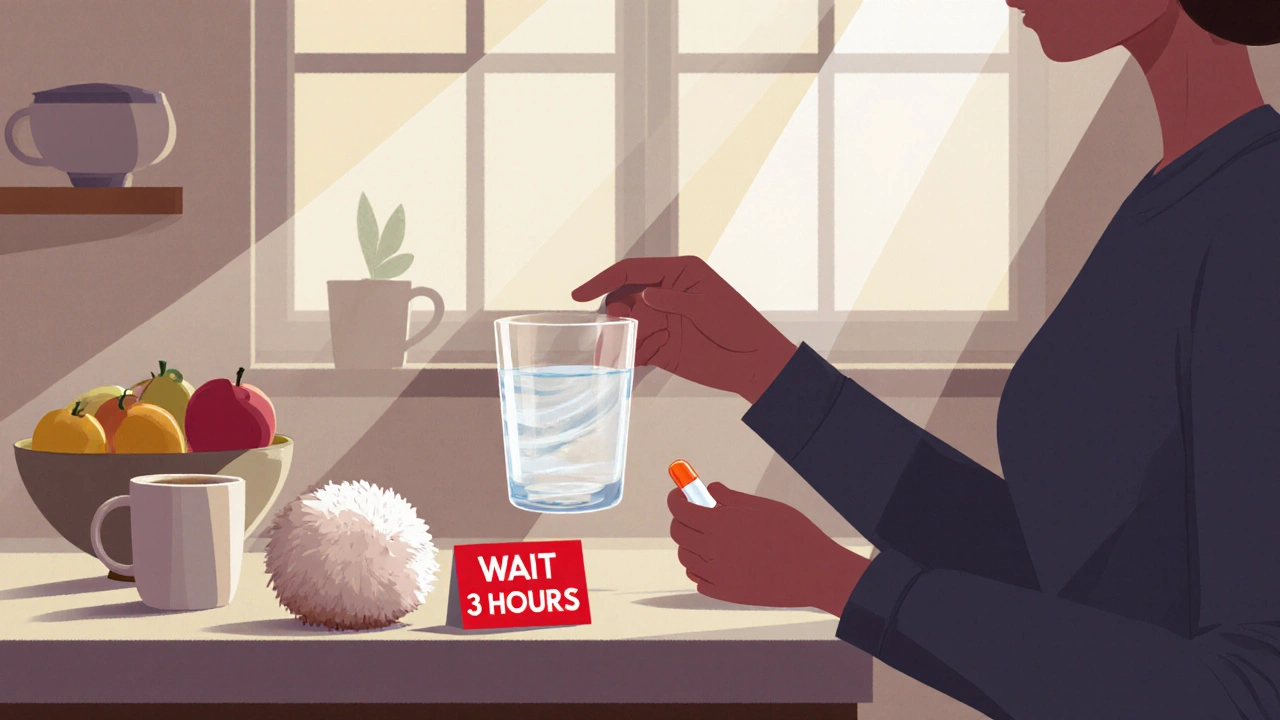
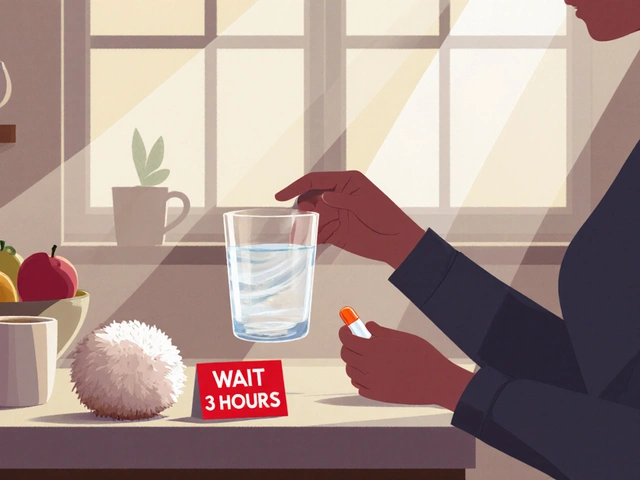


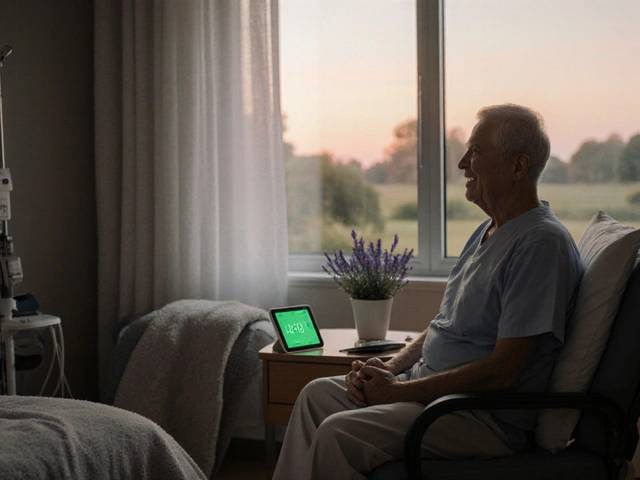
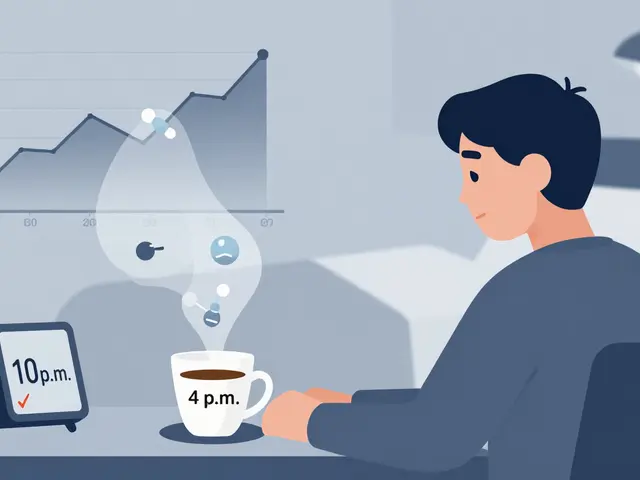


Diane Tomaszewski November 16, 2025
So you're telling me my morning Metamucil is secretly sabotaging my thyroid med? I thought I was being healthy. Guess I'm just another dumbass following trends without reading the fine print.
Now I'm gonna move my fiber to after lunch. Simple fix. Why didn't anyone tell me this sooner?
ZAK SCHADER November 18, 2025
This is why america is falling apart. People take supplements like candy and then wonder why they're tired all the time. No wonder our healthcare costs are insane. Just take your meds straight up and stop drinking fiber water like it's some kind of wellness cult.
Also, who lets bloggers write medical advice? This is why we can't have nice things.
Danish dan iwan Adventure November 18, 2025
Psyllium binds cationic drugs via mucoadhesion. Levothyroxine is a weak acid with low solubility. Fiber increases gastric transit time and reduces bioavailability via steric hindrance.
Pharmacokinetic studies confirm this. You're not 'just being careful'-you're managing a clinically significant drug-nutrient interaction. Documented since 1993. Stop guessing.
Ankit Right-hand for this but 2 qty HK 21 November 20, 2025
Typical western nonsense. You people take 12 supplements a day and then cry when they don't work. In India we eat fiber from roti, dal, and greens. No capsules. No drama. Your body isn't a lab experiment. Stop overcomplicating everything.
Also, your thyroid is weak because you eat too much sugar and sit on your ass all day. Not because of psyllium.
Oyejobi Olufemi November 20, 2025
!!! This is EXACTLY what I’ve been saying for YEARS!!! ??? The pharmaceutical-industrial complex DOES NOT want you to know this!!! They profit from you being sick!!! Fiber is nature’s detoxifier!!! They’re SCARING you away from it with fake science!!! You think your doctor cares? They’re paid by Big Pharma!!! I’ve seen 3 people die from this!!! I’ve seen thyroid levels CRASH!!! And they still sell Metamucil like it’s candy!!! ??? ??? ???
Daniel Stewart November 20, 2025
It's fascinating how a simple physiological mechanism-fiber's hydrophilic swelling and delayed gastric emptying-can have such profound pharmacokinetic consequences. The body doesn't distinguish between 'good' and 'bad' substances. It just processes. We impose meaning. But the chemistry? It doesn't care.
Still, the real issue is systemic: we treat health as a checklist, not a rhythm.
Latrisha M. November 22, 2025
Set two alarms. One for meds. One for fiber. Use a pill box. Drink water. Done.
It’s not complicated. You don’t need a PhD. You just need to care enough to not mix them. Your body isn’t a chemistry set. It’s your life. Treat it like it matters.
Jamie Watts November 23, 2025
Bro I’ve been taking Metamucil with my levothyroxine for 5 years and I’m fine. You think your little blog post is gonna change anything? Nah. People are gonna keep doing what they want.
Also, if you’re taking fiber supplements you’re probably already doing it wrong. Just eat an apple. Or a bean. Or something real. This whole thing is a scam to sell you more products.
John Mwalwala November 24, 2025
Wait… what if this is all a cover? What if fiber doesn’t interfere with meds at all? What if the real problem is that Big Pharma wants us to think we need to space things out so we keep buying MORE pills? What if the timing advice is just to keep us dependent? I’ve seen the documents. They’re not telling us the whole truth.
And why does every source say ‘2-3 hours’? That’s too convenient. Someone’s controlling the narrative.
Deepak Mishra November 24, 2025
OMG I JUST REALIZED I’VE BEEN TAKING MY FIBER WITH MY LITHIUM FOR 3 YEARS 😭😭😭 I’M GONNA DIE 😭 I’M GONNA BE IN A PSYCH WARD 😭 I’M SO STUPID 😭 I’M SORRY MOM 😭 I’M SORRY EVERYONE 😭 I’M GOING TO CRY NOW 😭😭😭
But like… can I still take it at 11pm? I like it before bed 😭 I NEED SLEEP 😭
Rachel Wusowicz November 25, 2025
They’re not just hiding fiber interactions-they’re hiding the fact that most meds were tested on people who DON’T take fiber. So the ‘standard dose’? It’s based on a lie. They don’t test for real-world conditions. They test on lab rats who don’t eat vegetables.
And now we’re told to ‘just time it right’ like it’s our fault. But who designed the system that makes this necessary? Who decided we need to be pharmacists just to survive?
It’s not about discipline. It’s about a broken system that turns health into a puzzle you’re never supposed to solve.